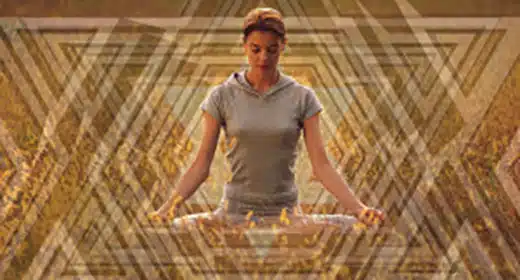A Zen Master and a Kabbalist walk beside a lake. The roshi turns to the rabbi and says, “You know, the Japanese always leave without saying goodbye. But the Jews — they say goodbye without leaving.” So summed up “Zen and Zohar On Repairing The World,” a recent weeklong spiritual gathering at theIsabella Freedman Jewish Retreat Center in Falls Village, Conn.
So summed up “Zen and Zohar On Repairing The World,” a recent weeklong spiritual gathering at theIsabella Freedman Jewish Retreat Center in Falls Village, Conn.
With koanic precision, the joke also highlights the differences between two meditation practices — Zen Buddhist sitting, with its emphasis on personal wisdom attained through silence, and Jewish contemplation, characterized by text-based reflection in a communal context — that have seemed, in the past half-century, to be one and the same.
Just look at the names. Many of the major American Buddhist teachers are Jewish. Besides Bernie Glassman and Eve Marko, who taught at the Zen and Zohar retreat, there’s Jack Kornfield, Sharon Salzberg, Norman Fischer and Sylvia Boorstein, to name a few.
“They both feed ultimately into the same place,” says Gail Albert, a retreat participant, “Seeing the extraordinary complexity of the world … as manifestation of the same source.”
Jewish and Buddhist meditation may have the same goal, but they manifest differently. And increasingly, the Jewish practice is asserting its unique identity.
The Zen and Zohar retreat was as much a merging of Buddhism and Judaism as it was a pulling apart of the two worlds. Co-sponsored by the Jewish Meditation Center of Brooklyn, it brought together Kabbalah teachers Daniel and Hana Matt and Buddhist practitioners Glassman and Marko. Two dozen participants practiced meditation and Jewish mystical text study in the mornings and took part in Zen sits and counsel sessions in the afternoons.
All participants at the Zen and Zohar retreat were Jewish. Some, though, were recently returned to their roots after a journey into the belly of the Buddha.
Alison Laichter, 31, the founder of the Jewish Meditation Center (JMC), says that many people at the retreat asked her similar questions: How is this different than Buddhism? How is this related to Buddhism?
“Look,” she would respond, “Buddhism doesn’t have a monopoly on the breath.”
In other words, breathing is not a Buddhist act. And following the breath is not inherently religious — it’s human.
It took a while for Laichter to realize this for herself. Having grown up in a Conservative Jewish community with Holocaust survivor grandparents, she says she did everything “right,” Jewishly. But eventually, she only participated out of guilty obligation. Meanwhile, Laichter discovered meditation and, seeking to learn more, found that all the teachers and books on the subject were Buddhist.
“And then I was all Buddhist all the time,” she says.
Though she’d discarded her Jewish identity, Laichter went on Birthright, a free trip to Israel. During the program, someone handed her a book on Jewish meditation — “God Is A Verb: Kabbalah and the Practice of Mystical Judaism” by Rabbi David A. Cooper — and her eyes were opened. “It was like, ‘How come nobody mentioned this to me?’”
The book propelled her to learn more about Jewish contemplative practice and, after seeking other books and teachers in California, Laichter decided maybe she wasn’t fully Buddhist. For a time, she embraced her inner “Jubu,” a term popularized in “The Jew in the Lotus,” Rodger Kamenetz’ book about a delegation of Jews meeting with the Dalai Lama. Eventually though, the label felt inauthentic and unfair to both traditions.
“I decided I would declare myself post-Jubu,” Laichter says, and as she got deeper into a practice of Jewish meditation, she realized she could be culturally and spiritually Jewish. Now, at the Jewish Meditation Center, which is the fulfillment of a dream to have a place to meditate in a Jewish context with friends, she’s professionally Jewish. And her center is empowering a new generation of Jewish meditators to become teachers.
At the JMC, Jews (and non-Jews) gather weekly for communal meditation, or “sits.” Beginner sits, which happen once a month, are usually attended by 30 to 40 people and include brief, guided meditations, like one that Daniel Matt shared at the Zen and Zohar retreat: The most powerful name of God, Matt says — the one no one knows how to pronounce, the one people have all sorts of ways to avoid announcing — is spelled in Hebrew Yod-Heh-Vav-Heh. Switch the letters around to Heh-Vav-Yod-Heh, which pronounced Havaya and means “Being.” Following the breath in meditation, simply inhale Hava and exhale Yah. Over and over.
At the regular sits, a volunteer provides a kavannah, or intention, for the meditation. This is based on the Torah portion for that specific week and is an interpretation that arose for the person while sitting with the text. Community members, many of whom never connected with Jewish text before finding the JMC, now discover deep meaning in Bible stories, often related to meditative practice.
Miriam Eisenberger, 31, who was at the Zen and Zohar retreat, attended the first ever JMC sit almost three years ago. Now, she is a program associate for the center and often leads the meditations.
If meditation is a tool for redirection, a retraining of the brain, then infusing that sitting practice with Jewish texts, ideas and understanding make it “Jewish meditation.” Conversely, infuse Jewish texts with meditation, and the stories come alive.
“When you start off,” Eisenberger says, “it just seems like, ‘God says this and Moses did that and blah blah blah blah blah.’ And then something starts popping out.”
Another retreat participant, Gail Albert, through her own Jewish meditation practice, found hidden beneath those Five Books of Moses a narrative of internal spiritual growth through meditation. She has never been to the JMC, but the same book that brought Laicther back to Judaism, brought Albert to the Zen and Zohar retreat in early July.
Like meditation, how she got there is a story of diversion and return: She missed a different retreat with Rabbi Cooper, the author of “God Is A Verb,” at the Isabella Freedman Center because of an illness. In his book, God is described not as a being, but as a process. God is not “God,” a static thing. God is God-ing. Similarly, humans are not cookie-cutter creations. Humans are creation-ing. Even while sitting in silence — especially while sitting in silence — there is movement. Albert had a credit to attend another retreat, and Rabbi Cooper recommended she go to this one. So she went.
Previously, Albert received certification to teach Jewish meditation from Chochmat Halev, an independent renewal center for Jewish learning and meditation. Now, she teaches a weekly meditation class at her synagogue in Woodstock, N.Y., and has recently finished writing a book, “Mending the Heart, Tending the Soul: A Seeker’s Path to the Garden Within,” which retraces the narrative of the Torah into a guide for inner transformation. Just like the Israelites, she says, a dedicated meditation practitioner moves from innocence to self aggrandizement to enslavement to freedom to compassion and lovingkindness.
The meditation at Isabella Freedman altered her consciousness more than ever, Albert says. For her, that consciousness is one in which she directly experiences a sense of divinity. But just as Moses never went into the Land of Israel, the Jewish meditator never reaches enlightenment.
“Maybe the Dalai Lama does,” Albert says. “We get closer to it, but we don’t get there.”
















































